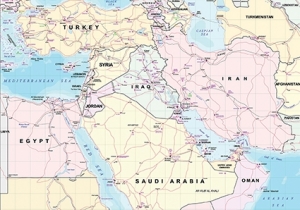From the Caspian Sea to the Persian Gulf?
Iran is trying to "reanimate" an old project: the construction of a navigable canal nearly 700 km long which will connect the Caspian Sea with the Persian Gulf. It will take about $10 billion to start the project but pay back is expected within the first five years of operation. This project is also interesting for Russia, since the new way to the Indian Ocean will be half as short as the route through the Turkish straits and the Suez Canal and will become an alternative to the existing route through the Bosporus-Dardanelles- Suez Canal and the Red Sea.
“The project of the Caspian-Persian Gulf navigation channel was developed by Russian engineers in 1889-1892,” says Candidate of Economic Sciences, Alexei Chichkin, on the website of the Military Industrial Courier. "The appearance of the project was facilitated by the collective refusal of Britain, France, Austria-Hungary and Germany to support the Russian proposals of 1878 concerning conferring control of the Bosporus and Dardanelles to St. Petersburg and allowing the deployment there of its military bases. The fact is that over half the volume of Russia's foreign trade was carried out this way. And it is through it that the invaders supported by Turkey repeatedly penetrated the Black Sea and, accordingly, the shores of the empire”.
In 1908, negotiations were suspended: among other things, the pressure on Tehran from Istanbul and London contributed to this. Then the First World War broke out.
Under Stalin and later, both sides made several attempts to reanimate the project, but the implementation of the plans was always hampered by one thing or another. In addition, the United States and NATO have created obstacles to the construction. The West has never been happy about the possible appearance of such a channel and is still not happy with it. It was no accident that in 1997, the anti-Iranian sanctions of the United States spread to this project.
Since the recent development of troubled relations with Turkey, Russia is interested in a water alternative to the Turkish straits. And now with the lifting of sanctions, Iran can fully return to the old project. All it needs is investment, and this, experts say, is where the latest problems begin.
Colonel Oleg Antipov in 2012 told IA ‘REX’ that the topic of the channel is very interesting for Russia and Iran, as well as for the region as a whole, including India, China, Pakistan and others. However, he pointed out that in addition to US pressure, one should also remember ecology:
"...we must remember the environment. After all, the Caspian Sea is below sea level and is necessarily littered with its own types of algae and fish. Sturgeon and beluga will become extinct and traditional Russian black caviar will be unavailable to please us even on our biggest holidays. So, we need to weigh everything before building this channel. And, of course, Iran needs to obtain the consent of all countries of the Caspian basin before construction. I grew up in Baku on the Caspian coast, and I would like this pearl of nature to continue to please our descendants, and not be turned into a gutter”.
Political Scientist Ilgar Velizadeh notes that it was in Tehran in November 2003 that the Framework Convention for the Protection of the Marine Environment of the Caspian Sea (the "Tehran Convention") was signed. Among the priority areas of the document is the topic of cooperation between states in developing coordinated measures to mitigate the consequences of fluctuations in the level of the Caspian Sea. "I do not think that Tehran will depart from its practice of carefully weighing all the pros and cons, nor will it make an irresponsible decision," the expert said.
Iranian Ecologist Professor Ismail Kakhrom is skeptical about the project. “One gram of water of the Caspian Sea contains 13 grams of salt. The use of such water for agricultural purposes is impossible, and desalting it is unprofitable,” he says, adding that there is no land suitable for agriculture in the Iranian province of Simnan and the central regions as the soil there is predominantly sandy and clay-based.
Chichkin argues that “the Caspian-Persian Gulf shipping canal, which runs all over Iran, is able to provide the shortest access to the Indian Ocean basin from the North Atlantic, the Baltic, the Black Sea-Azov, the Danube and the Volga-Caspian basins. This route is necessary for Iran not only as a transport corridor, but also as a source of fresh water supply to the central arid regions of the country".
The length of the navigable route under the project will be about 700 km, including along the riverbeds of northwestern and southwestern Iran, including the international channel of the Shatt al-Arab river (about 450 km) bordering Iraq. The new channel could provide both Russia and Iran with transit revenues of $ 1.2-1.4 billion and $1.4-1.7 billion, respectively.
Azerbaijan believes that the idea of the proposed channel is technically unworkable. Expert in the field of water management, Ibrahim Mamedzadeh, asserts that the use of the Shatt al-Arab river in the project is very doubtful. “This river is far from being a navigable artery like the other rivers mentioned in the project”.
As for Russian politicians and experts, they have not yet commented on the possible "resuscitation" of the channel. In principle, the authorities' silence is understandable: in these times of low oil prices and sanctions, the budget has become idle, and the country's economy is going through bad times. In such conditions, large investments for Moscow are hardly likely. In addition, no matter how "tempting" is would be to bypass Ankara, investors will not see quick payback. We must also remember the pressure of the West, which has long objected to such a project.
Dimitri Dolaberidze











